2024届高三英语二轮复习情态动词专题语法课件-(共22张PPT)
文档属性
| 名称 | 2024届高三英语二轮复习情态动词专题语法课件-(共22张PPT) |
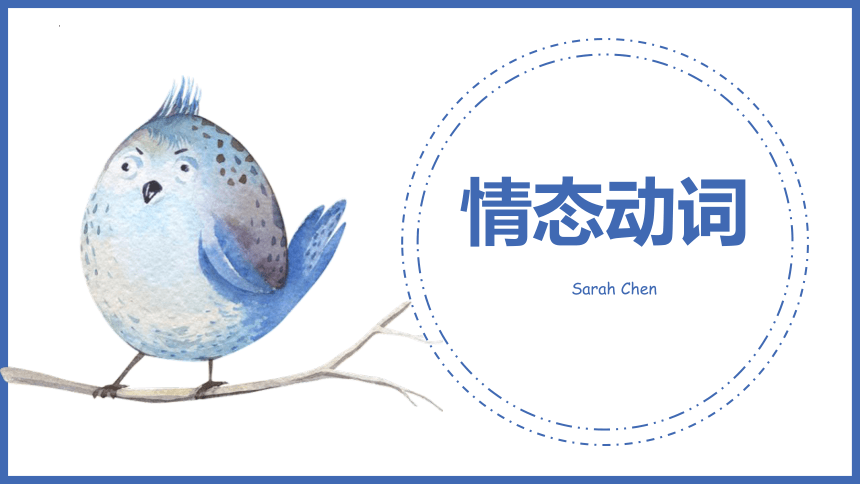
|
|
| 格式 | pptx | ||
| 文件大小 | 1.3MB | ||
| 资源类型 | 教案 | ||
| 版本资源 | 人教版(2019) | ||
| 科目 | 英语 | ||
| 更新时间 | 2024-01-03 07:25:57 | ||
图片预览

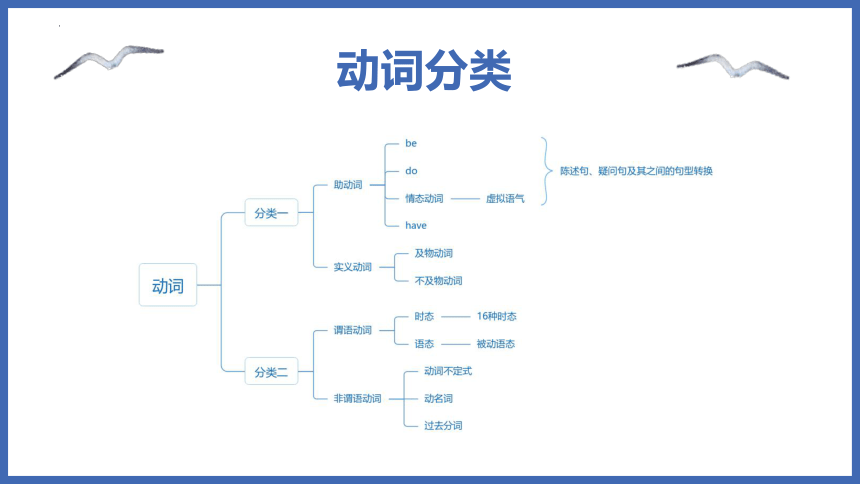


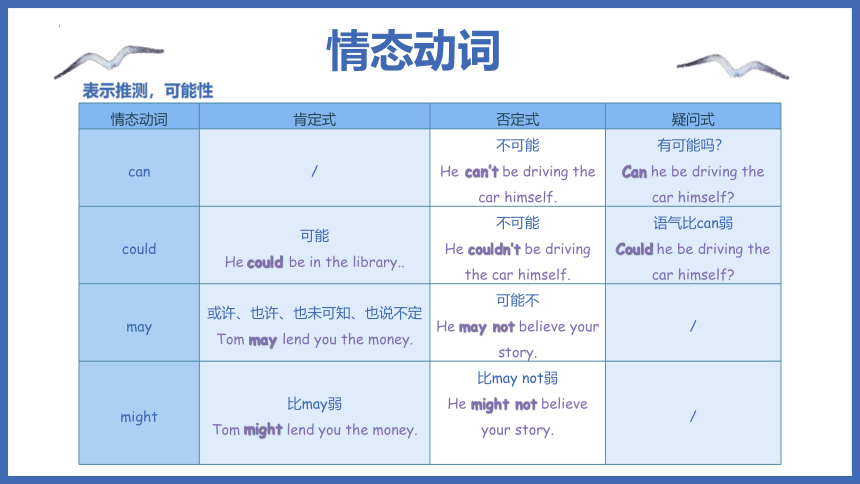


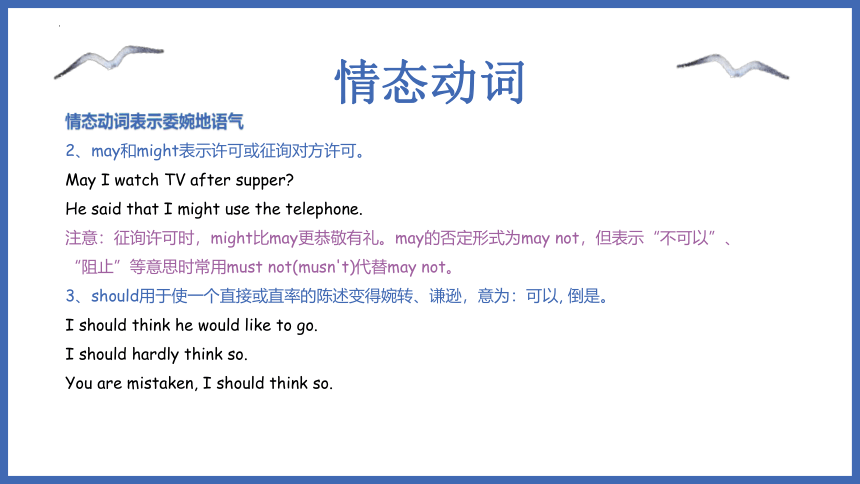
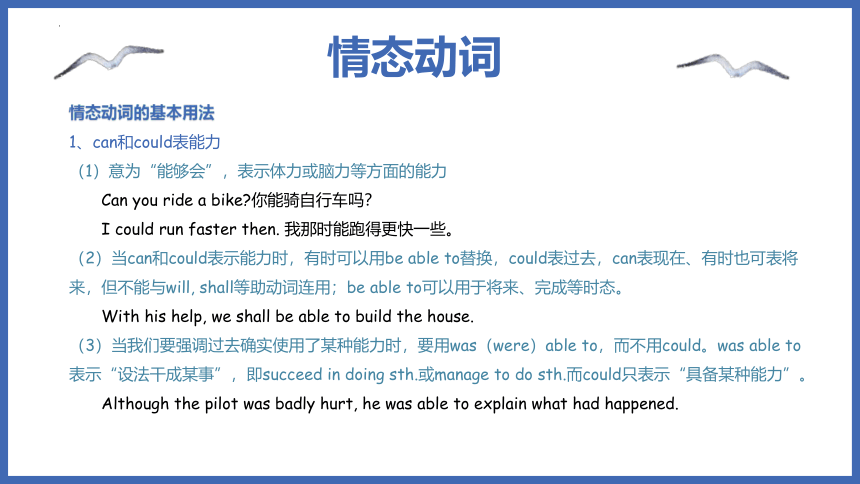
文档简介
(共22张PPT)
情态动词
Sarah Chen
动词分类
情态动词
表示说话人对某一动作或状态的态度,认为“可能、应当、必要”等等,但本身意义不完全,不能单独作谓语,必须和其他动词一起构成谓语
没有人称和数的变化。
后面跟动词原形
ought, used, have后跟不定式
情态动词
表示推测,可能性
情态动词 肯定式 否定式 疑问式
must 必定、必然 He has a house in Beijing and another in Shanghai ,so he must be rich. / /
will 很可能、大概 He will be expecting a call from you. 不会、不该 It’s no use asking Tom,he won’t know. 会…吗?
Will Bill be at the club now, do you think
would 可能性比will小 He would be expecting a call from you. 语气比won’t弱 It’s no use asking Tom,he wouldn’t know. 语气比will弱
Would Bill be at the club now, do you think
should 确定或可能有的或期待 The plane should be landing now. / /
ought to 应该、理应(含义同should) The plane ought to be landing now. / /
情态动词
表示推测,可能性
情态动词 肯定式 否定式 疑问式
can / 不可能 He can’t be driving the car himself. 有可能吗?
Can he be driving the car himself
could 可能 He could be in the library.. 不可能 He couldn’t be driving the car himself. 语气比can弱
Could he be driving the car himself
may 或许、也许、也未可知、也说不定 Tom may lend you the money. 可能不 He may not believe your story. /
might 比may弱 Tom might lend you the money. 比may not弱 He might not believe your story. /
情态动词
表示某一特定的语气
1、can用于否定句、疑问句和感叹句中,表惊异怀疑、不相信等态度。
Where can they be now
What can he mean
2、must表示与说话人愿望相反及不耐烦,意为:偏要。
Why must it rain on Sunday
3、may表祝愿(不能用might)。
May all our dreams come true.
May that day come soon.
4、should与why, who, how 等连用, 表示说话人对某事不理解、感到意外、惊异等意思,意为:竟会。
Why should you be so late today
I don’t know why you should think that I did it.
情态动词
情态动词表示委婉地语气
1、can和could
表比较委婉客气地提出请求。这时could和can没有时间上的差别,只不过用could比用can显得更加委婉客气。
-Could /Might I borrow your dictionary
-Yes, of course you can/may.
- No, I’m afraid not.
注意:回答允许时肯定的回答用can,不能用could/might。
情态动词
情态动词表示委婉地语气
2、may和might表示许可或征询对方许可。
May I watch TV after supper
He said that I might use the telephone.
注意:征询许可时,might比may更恭敬有礼。may的否定形式为may not,但表示“不可以”、“阻止”等意思时常用must not(musn't)代替may not。
3、should用于使一个直接或直率的陈述变得婉转、谦逊,意为:可以, 倒是。
I should think he would like to go.
I should hardly think so.
You are mistaken, I should think so.
情态动词
情态动词的基本用法
1、can和could表能力
(1)意为“能够会”,表示体力或脑力等方面的能力
Can you ride a bike 你能骑自行车吗?
I could run faster then. 我那时能跑得更快一些。
(2)当can和could表示能力时,有时可以用be able to替换,could表过去,can表现在、有时也可表将来,但不能与will, shall等助动词连用;be able to可以用于将来、完成等时态。
With his help, we shall be able to build the house.
(3)当我们要强调过去确实使用了某种能力时,要用was(were)able to,而不用could。was able to 表示“设法干成某事”,即succeed in doing sth.或manage to do sth.而could只表示“具备某种能力”。
Although the pilot was badly hurt, he was able to explain what had happened.
情态动词
情态动词的基本用法
2、must和have to
(1)must表示“必须”,“应该”。否定式must not(mustn't)表示“不应该”,“不许可”,“不准”,“禁止”等。在回答带有must的问句时,否定式常用need not(needn't)或don't have to 表示“不必”,而不用must not (mustn't)。
The work must be finished as soon as possible.
You mustn't speak like that.
(2)have to表示“必须”,“不得不”,在这个意义上与must与很接近,但must表示的是说话人的主观看法,而have to 表示的却是客观需要。have to 有更多的时态形式:现在时,过去时,将来时等,而must只有现在时形式。have to 不能代替表推测的must.
I have to go now. (客观需要)
I must go now. (主观看法)
I shall have to go to school tomorrow.
You must be joking.(不能用have to)
情态动词
情态动词的基本用法
3、shall
(1)用在疑问句中,用来征求对方意见、提出建议,用于第一、三人称。
Shall we start the meeting now
Shall those books be sent over to you at once
(2)用于第二、三人称,表示说话者的意图、警告、命令、决心、许诺等, 主语的行动受讲话者支配。意为:必须, 应, 可
He shall suffer for this. (警告,威胁)
He shall pay you what he owes you. (命令)
He shall have a bicycle for his birthday.他可以得到一架自行车作为生日礼物。
情态动词
情态动词的基本用法
3、shall
(3)在问句中, 征询对方对于主语行动的意见(提供帮助, 提出建议、要求给予指示和征求意见), 主要用于第一、三人称。意为:… 好吗 要不要…
Shall I carry your bag
Shall he come to see you
(4)用于第三人称, 在条约、规定、法令等文件中表示义务或规定。意为:应, 必须
No reader shall remove a book from the library without consent of the librarian.
情态动词
情态动词的基本用法
4、should
(1)表“劝告、建议”时,可译成“应该”,这时可用ought to替换。
You should keep your promise.
(2)表示委婉陈述自己的意见。
I should think you are right.
I should advise you not to go now.
(3)表示惊异赞叹、忧虑、惋惜、欢欣、不满等情绪。
Why should you think so (不满)
It's strange that it should be so hot today. (惊奇)
(4)表推测
意为“可能,该”,表示对现在情况、将来情况的某推测。
They should be home by now.
The book you need should be in our library.
情态动词
情态动词的基本用法
5、ought to
常译作“应该”,“应当”等,和should同义,只是口气稍重一些。
You ought to start at once你应该立刻出发。
6、used to
(1)在肯定句中,表示过去常常做某事,强调已经中断的习惯,过去和现在不同。注意和be used to do sth.(习惯做某事,used作形容词)的区分。
He used to smoke 20 cigarettes a day.
There used to be a building there.
I am used to working in a noisy room.
(2)在疑问句、否定句中,可以有两种形式:
Used you to go to work by bike
=Did you use to go to work by bike
—Yes, I did/ I used to. - No,I didn’t/I usedn’t to.
情态动词
情态动词的基本用法
7、dare
dare作情态动词表示“敢”,主要用于否定句、疑问句和感叹句,无词形变化,单数第三人称不加-s。
(1)通常用于否定句和疑问句,其用法同其他情态动词。
She daren't even look out.
Dare you go to school by yourself
How dare you say I am unfair
I dare not sleep in that room again.
(2)当肯定句中含有否定意义或疑问意义时,或者状语从句中,可以用dare。
I hardly dare think of it.
He asked me whether I dare swim across the river.
I won't allow you to swim across the river, even if you dare do it.
情态动词
情态动词的基本用法
8、need
(1)表示 "必要;必须",通常用于否定句和疑问句
Need he work so hard
You needn't worry about it.
I hardly need say how much we missed you.
(2)在肯定句中,它被must或have to 取代。
—Need I come
—Yes, you must/have to.
You needn't see him, but I must /have to.
(3)“need+一般式”,通常表示现在和未来,有时也可指过去。
She need not come. 现在或将来)
We were told that we needn't do that. (过去)
情态动词
情态动词的基本用法
9、will
(1)表意志、意愿、允诺,可用于多种人称。
I will tell you all about it. (意愿)
(2)用于第二、第三人称的疑问句中,表询问或请求。
I'm going to the library. Will you go with me (询问)
Will you give him a message when you see him (请求)
(3)用于第二、三人称表推测。
That man with the book will be Mr. mith.
(4)有时表示一种习惯性动作,常用于第三人称。
Fish will die out of water.
情态动词
情态动词的基本用法
10、would
(1)would是will的过去式,表示过去时间的意志、意愿、决心,用于各种人称。
They said they would help us.
(2)would表示说话人的意愿或向对方提出请求,语气比will婉转,仍指现在时间。
Would you like some bananas
(3)表示过去习惯发生的动作(与used to有区别)。
The old worker would often go to the park to play chess.
She would come to see me now and then.
(4)表示推测。
You would be about 10 years old then.
情态动词
情态动词的基本用法
used to 与would的区别:
情态动词used to 和would都可以表示过去的习惯性动作,但有下列不同点:
used to 不需与确定的过去时间连用,而would一般与时间状语连用。used to 含有与现在相比较的意思,而would没有。
He used to get up early. (现在不早起了)
The old man would go to the park every day to have morning exercises. (没有与现在相比较的意思)
used to 指过去反复发生或持续发生的动作,而would仅指过去反复发生的动作,不指持续发生的动作;另外,used to 既表动作还表状态,而would只表动作不表状态,因此下列句中的used to 不能用would代替。
People used to think that the earth was flat. 人们过去认为地球是平的。
She used to be very nervous in the exam. 她以前考试常常很紧张。
情态动词
情态动词的基本用法
“情态动词+be doing”的用法
1、推测或评论某动作是否正在进行
Our teacher must be correcting our exam papers.
He can't be working now.
We may be playing tennis at nine tomorrow.
2、表示“即将;将要”这类意思
I must be going now.
She may be leaving tomorrow.
3、用来表示"老是做某事"
If you really want yourself to be in good health, you must not always be smoking so much.
情态动词
情态动词的基本用法
习惯表达
1、cannot… too/ enough表示“无论怎样…也不过分”“越…越好”。
You cannot be careful enough when crossing the street.
2、can’t but do 表示“不得不、只好”。
I can’t but stay at home.
3、may well+动词原形,表示“很有可能,完全能”。相当于be likely to do。
He may well be proud of his son.
4、“may as well+动词原形”表示“最好,满可以,倒不如”,相当于had better.
We may as well stay where we are.
You may as well tell me the truth.
Thank you
情态动词
Sarah Chen
动词分类
情态动词
表示说话人对某一动作或状态的态度,认为“可能、应当、必要”等等,但本身意义不完全,不能单独作谓语,必须和其他动词一起构成谓语
没有人称和数的变化。
后面跟动词原形
ought, used, have后跟不定式
情态动词
表示推测,可能性
情态动词 肯定式 否定式 疑问式
must 必定、必然 He has a house in Beijing and another in Shanghai ,so he must be rich. / /
will 很可能、大概 He will be expecting a call from you. 不会、不该 It’s no use asking Tom,he won’t know. 会…吗?
Will Bill be at the club now, do you think
would 可能性比will小 He would be expecting a call from you. 语气比won’t弱 It’s no use asking Tom,he wouldn’t know. 语气比will弱
Would Bill be at the club now, do you think
should 确定或可能有的或期待 The plane should be landing now. / /
ought to 应该、理应(含义同should) The plane ought to be landing now. / /
情态动词
表示推测,可能性
情态动词 肯定式 否定式 疑问式
can / 不可能 He can’t be driving the car himself. 有可能吗?
Can he be driving the car himself
could 可能 He could be in the library.. 不可能 He couldn’t be driving the car himself. 语气比can弱
Could he be driving the car himself
may 或许、也许、也未可知、也说不定 Tom may lend you the money. 可能不 He may not believe your story. /
might 比may弱 Tom might lend you the money. 比may not弱 He might not believe your story. /
情态动词
表示某一特定的语气
1、can用于否定句、疑问句和感叹句中,表惊异怀疑、不相信等态度。
Where can they be now
What can he mean
2、must表示与说话人愿望相反及不耐烦,意为:偏要。
Why must it rain on Sunday
3、may表祝愿(不能用might)。
May all our dreams come true.
May that day come soon.
4、should与why, who, how 等连用, 表示说话人对某事不理解、感到意外、惊异等意思,意为:竟会。
Why should you be so late today
I don’t know why you should think that I did it.
情态动词
情态动词表示委婉地语气
1、can和could
表比较委婉客气地提出请求。这时could和can没有时间上的差别,只不过用could比用can显得更加委婉客气。
-Could /Might I borrow your dictionary
-Yes, of course you can/may.
- No, I’m afraid not.
注意:回答允许时肯定的回答用can,不能用could/might。
情态动词
情态动词表示委婉地语气
2、may和might表示许可或征询对方许可。
May I watch TV after supper
He said that I might use the telephone.
注意:征询许可时,might比may更恭敬有礼。may的否定形式为may not,但表示“不可以”、“阻止”等意思时常用must not(musn't)代替may not。
3、should用于使一个直接或直率的陈述变得婉转、谦逊,意为:可以, 倒是。
I should think he would like to go.
I should hardly think so.
You are mistaken, I should think so.
情态动词
情态动词的基本用法
1、can和could表能力
(1)意为“能够会”,表示体力或脑力等方面的能力
Can you ride a bike 你能骑自行车吗?
I could run faster then. 我那时能跑得更快一些。
(2)当can和could表示能力时,有时可以用be able to替换,could表过去,can表现在、有时也可表将来,但不能与will, shall等助动词连用;be able to可以用于将来、完成等时态。
With his help, we shall be able to build the house.
(3)当我们要强调过去确实使用了某种能力时,要用was(were)able to,而不用could。was able to 表示“设法干成某事”,即succeed in doing sth.或manage to do sth.而could只表示“具备某种能力”。
Although the pilot was badly hurt, he was able to explain what had happened.
情态动词
情态动词的基本用法
2、must和have to
(1)must表示“必须”,“应该”。否定式must not(mustn't)表示“不应该”,“不许可”,“不准”,“禁止”等。在回答带有must的问句时,否定式常用need not(needn't)或don't have to 表示“不必”,而不用must not (mustn't)。
The work must be finished as soon as possible.
You mustn't speak like that.
(2)have to表示“必须”,“不得不”,在这个意义上与must与很接近,但must表示的是说话人的主观看法,而have to 表示的却是客观需要。have to 有更多的时态形式:现在时,过去时,将来时等,而must只有现在时形式。have to 不能代替表推测的must.
I have to go now. (客观需要)
I must go now. (主观看法)
I shall have to go to school tomorrow.
You must be joking.(不能用have to)
情态动词
情态动词的基本用法
3、shall
(1)用在疑问句中,用来征求对方意见、提出建议,用于第一、三人称。
Shall we start the meeting now
Shall those books be sent over to you at once
(2)用于第二、三人称,表示说话者的意图、警告、命令、决心、许诺等, 主语的行动受讲话者支配。意为:必须, 应, 可
He shall suffer for this. (警告,威胁)
He shall pay you what he owes you. (命令)
He shall have a bicycle for his birthday.他可以得到一架自行车作为生日礼物。
情态动词
情态动词的基本用法
3、shall
(3)在问句中, 征询对方对于主语行动的意见(提供帮助, 提出建议、要求给予指示和征求意见), 主要用于第一、三人称。意为:… 好吗 要不要…
Shall I carry your bag
Shall he come to see you
(4)用于第三人称, 在条约、规定、法令等文件中表示义务或规定。意为:应, 必须
No reader shall remove a book from the library without consent of the librarian.
情态动词
情态动词的基本用法
4、should
(1)表“劝告、建议”时,可译成“应该”,这时可用ought to替换。
You should keep your promise.
(2)表示委婉陈述自己的意见。
I should think you are right.
I should advise you not to go now.
(3)表示惊异赞叹、忧虑、惋惜、欢欣、不满等情绪。
Why should you think so (不满)
It's strange that it should be so hot today. (惊奇)
(4)表推测
意为“可能,该”,表示对现在情况、将来情况的某推测。
They should be home by now.
The book you need should be in our library.
情态动词
情态动词的基本用法
5、ought to
常译作“应该”,“应当”等,和should同义,只是口气稍重一些。
You ought to start at once你应该立刻出发。
6、used to
(1)在肯定句中,表示过去常常做某事,强调已经中断的习惯,过去和现在不同。注意和be used to do sth.(习惯做某事,used作形容词)的区分。
He used to smoke 20 cigarettes a day.
There used to be a building there.
I am used to working in a noisy room.
(2)在疑问句、否定句中,可以有两种形式:
Used you to go to work by bike
=Did you use to go to work by bike
—Yes, I did/ I used to. - No,I didn’t/I usedn’t to.
情态动词
情态动词的基本用法
7、dare
dare作情态动词表示“敢”,主要用于否定句、疑问句和感叹句,无词形变化,单数第三人称不加-s。
(1)通常用于否定句和疑问句,其用法同其他情态动词。
She daren't even look out.
Dare you go to school by yourself
How dare you say I am unfair
I dare not sleep in that room again.
(2)当肯定句中含有否定意义或疑问意义时,或者状语从句中,可以用dare。
I hardly dare think of it.
He asked me whether I dare swim across the river.
I won't allow you to swim across the river, even if you dare do it.
情态动词
情态动词的基本用法
8、need
(1)表示 "必要;必须",通常用于否定句和疑问句
Need he work so hard
You needn't worry about it.
I hardly need say how much we missed you.
(2)在肯定句中,它被must或have to 取代。
—Need I come
—Yes, you must/have to.
You needn't see him, but I must /have to.
(3)“need+一般式”,通常表示现在和未来,有时也可指过去。
She need not come. 现在或将来)
We were told that we needn't do that. (过去)
情态动词
情态动词的基本用法
9、will
(1)表意志、意愿、允诺,可用于多种人称。
I will tell you all about it. (意愿)
(2)用于第二、第三人称的疑问句中,表询问或请求。
I'm going to the library. Will you go with me (询问)
Will you give him a message when you see him (请求)
(3)用于第二、三人称表推测。
That man with the book will be Mr. mith.
(4)有时表示一种习惯性动作,常用于第三人称。
Fish will die out of water.
情态动词
情态动词的基本用法
10、would
(1)would是will的过去式,表示过去时间的意志、意愿、决心,用于各种人称。
They said they would help us.
(2)would表示说话人的意愿或向对方提出请求,语气比will婉转,仍指现在时间。
Would you like some bananas
(3)表示过去习惯发生的动作(与used to有区别)。
The old worker would often go to the park to play chess.
She would come to see me now and then.
(4)表示推测。
You would be about 10 years old then.
情态动词
情态动词的基本用法
used to 与would的区别:
情态动词used to 和would都可以表示过去的习惯性动作,但有下列不同点:
used to 不需与确定的过去时间连用,而would一般与时间状语连用。used to 含有与现在相比较的意思,而would没有。
He used to get up early. (现在不早起了)
The old man would go to the park every day to have morning exercises. (没有与现在相比较的意思)
used to 指过去反复发生或持续发生的动作,而would仅指过去反复发生的动作,不指持续发生的动作;另外,used to 既表动作还表状态,而would只表动作不表状态,因此下列句中的used to 不能用would代替。
People used to think that the earth was flat. 人们过去认为地球是平的。
She used to be very nervous in the exam. 她以前考试常常很紧张。
情态动词
情态动词的基本用法
“情态动词+be doing”的用法
1、推测或评论某动作是否正在进行
Our teacher must be correcting our exam papers.
He can't be working now.
We may be playing tennis at nine tomorrow.
2、表示“即将;将要”这类意思
I must be going now.
She may be leaving tomorrow.
3、用来表示"老是做某事"
If you really want yourself to be in good health, you must not always be smoking so much.
情态动词
情态动词的基本用法
习惯表达
1、cannot… too/ enough表示“无论怎样…也不过分”“越…越好”。
You cannot be careful enough when crossing the street.
2、can’t but do 表示“不得不、只好”。
I can’t but stay at home.
3、may well+动词原形,表示“很有可能,完全能”。相当于be likely to do。
He may well be proud of his son.
4、“may as well+动词原形”表示“最好,满可以,倒不如”,相当于had better.
We may as well stay where we are.
You may as well tell me the truth.
Thank you
